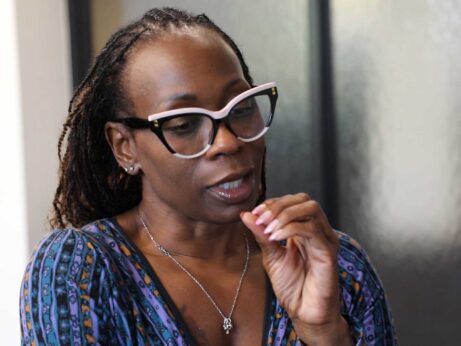
CHICAGO—“It’s not radical for us to believe in humanity,” Rania Batrice, former Deputy Campaign Manager for Bernie Sanders, said to a crowd of delegates, union workers, and peace activists at the Chicago Teachers Union hall ahead of the Democratic National Convention on Sunday evening.

The panel at Progressive Central, “Palestine and Foreign Policy,” convened to address the necessity of mass movements in order to demand U.S. foreign policy stop supporting Israel’s genocide in Gaza.
James Zogby, the founder and president of the Arab American Institute, mentioned that the difference between the Palestinian solidarity movement in the 1980s during Jesse Jackson’s presidential runs, when he was the deputy campaign manager and senior advisor, and now, is the massive upsurge in young people participating.
“We would chant ‘Hey, hey, you should know, we support the PLO!’” Zogby said. But the movement then was much smaller, he noted. “Now, the consciousness of young people is rapidly developing. Young people know the world now in ways that older folks back then didn’t.”
That new knowledge, Rep. Ro Khanna, D-Calif., told the session, includes the role British imperialism in the Middle East and South Asia played in trying to create conflict between Palestinians and Jews more than a century ago.
“This goes back to the Balfour Declaration of 1917. They [the British] engaged in colonization,” including in Palestine. “They said the people in Palestine could have economic rights but not political rights. Until we recognize Palestinians’ right of self-determination, we don’t have peace in the Middle East.”
Another reason for the mass character of today’s movement, Zogby said, was that young people understand the interconnectedness of the burning issues facing our country. “The same folks turning out for Black Lives Matter, the anti-Muslim ban protests, the climate movement, the labor movement, women’s rights…are turning out here” for Palestinian solidarity.
On Monday, protests are planned to march on the DNC to demand a change in the Biden administration’s policy of giving the Israeli government a blank check to continue its slaughter in Gaza.
For nearly a year, the Israeli military has decimated Palestinians living in the Gaza Strip, killing more than 40,000 people. In the occupied West Bank, meanwhile, it also stepped up repression and support for illegal settlements, resulting in a major increase in evictions and murder of Palestinians.
In response, the peace movement in the United States, and around the world, has escalated its tactics—starting with street demonstrations, then setting up campus divestment encampments, passing ceasefire resolutions in municipalities and trade union resolutions, to the Uncommitted Movement—a campaign that saw more than 730,000 people cast a protest vote opposing the war in Gaza by rejecting President Joe Biden in the Democratic Primaries.
More recently, in the run up to the Democratic National Convention, the campaign has centered its focus on an arms embargo on the Israeli military, with 90 mobilizations held across 35 states this past weekend. It has gained the support of broad swaths of civil society, including Jewish Voice for Peace, the Movement for Black Lives, Rising Majority, the Working Families Party, and the Communist Party USA.

“The marches here at the DNC are not different from the March on Washington for jobs and freedom, it’s the same thing,” Nina Turner, former Ohio state senator, told People’s World. “It’s the same force for justice.”
“I remain cautiously optimistic that there can be a chance here to move the needle” with regards to the peace movement’s demands on Kamala Harris for an immediate ceasefire and an arms embargo, Batrice told People’s World. “There has been a shift in rhetoric” coming from the Harris-Walz ticket, “but kids that are starving and being pummeled in Gaza can’t eat rhetoric,” she said.
“We can send another $20 billion” to fund Israel’s genocide on Gaza “but we can’t afford justice and equality in our own country?” asked Batrice. “We need to see a change in policy.”
“Our country needs to follow our own damn laws and international law,” she said.
Among these is the Leahy Law, named after Sen. Patrick Leahy of Vermont, passed nearly 30 years ago by Congress, which dictates that there must be an automatic cut-off of arms sales to foreign governments if the U.S. State Department finds “credible evidence” of human rights abuses.
The Biden administration’s State Department has not only failed to investigate human rights abuses by Israel but also condemned the International Court of Justice ruling that it was “plausible” that Israel was not only committing gross human rights violations but even engaging in genocide.
“This is mass movement-led, not candidate-led,” Zogby said. “We have the Uncommitted Movement making a major impact on politics.”
Turner agreed. “Hundreds of thousands of people across the country got out of their bed, even though only Biden was on the ballot, and voted [uncommitted].”
“I applaud the uncommitted movement,” she added.
Medea Benjamin, co-founder of Codepink, told People’s World that “the only way we will push change” on the Democratic Party’s policies “is to demand that they stop sending weapons and secure a permanent ceasefire.”
The Democratic National Convention opens Monday in Chicago. The peace movement will be paying close attention, and activists working both inside and outside the convention hall are raising their voices and demanding that a change must come. The future of our democracy is at stake and this is not only a burning issue, but a winning issue, they said.
Mark Gruenberg contributed to this story.











